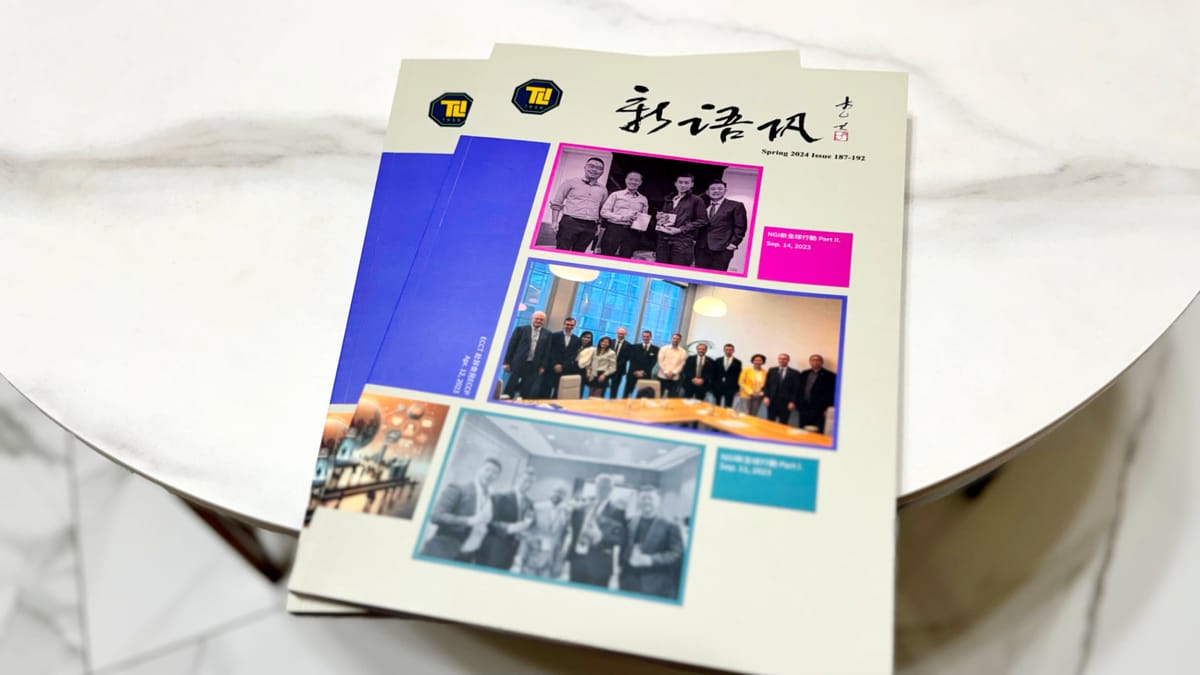My Taiwanese print debut
Six months ago, I was asked to write something for a magazine…

Language Interaction is a magazine published by TLI, where I’ve been studying Chinese part-time.
I was asked to contribute an article about learning Chinese, interacting with locals, and starting a business in Taiwan. And to provide language-learning tips (which, as a mediocre student, I’m really not qualified to do).
Six months on I wish I could give the whole thing a heavy edit—but anyway, here it is:
When I first visited Taiwan, on holiday in 2018 and again in 2019, I could say three things in Chinese:
- Nǐ hǎo (hello)
- Xiè xiè (thank you)
- Tài hǎo le! (great!)
Luckily, there are many great things in Taiwan. So that last phrase was useful.
When Taichung’s Grandpa Rainbow showed me art in the gift shop, I said “tài hǎo le!” When I had excellent coffee in Jiufen, I said “tài hǎo le!” And when my taxi driver stopped to point at flowers, I said “tài hǎo le!”
Luckily I had no bad experiences, as I would’ve lacked the vocabulary to respond…
So, after Taiwan stole my heart and I decided to relocate here—to an island where I could only say three things and where I didn’t know anybody—logic suggested I should learn more Chinese. After all, not everything in life deserves an enthusiastic “tài hǎo le!” (Stinky tofu, anyone?)
Back in New Zealand, while preparing to move by closing my business and selling my house, I started online Chinese lessons for 1–2 hours a day.
Despite other commitments, I looked forward to every class. My teachers were amazing.
But I wasn’t the best student. I didn't have much time to study between those initial classes, and I was slow to grasp the tones. However, by the time I arrived in Taiwan a couple of months later, with my teachers’ guidance I felt comfortable asking for a bag at the supermarket, complimenting people on their delicious food, and explaining that I couldn’t understand.
In Kaohsiung, I joined on-campus classes. This added another dimension to my studies. Although I’d benefited greatly from the one-on-one online lessons, my learning accelerated in the small group class. And in turn, this accelerated my sense of settling in to a new country.
Perhaps I perpetually look in need of assistance, but here in Kaohsiung, strangers often check if they can help. Or, more commonly, ask if I'm American.
I reply “wǒ bú shì měiguórén, wǒ shì niǔxīlánrén” (I am not American, I am a New Zealander). This surprises people. Questions about my nationality and Chinese ability always follow.
Strangers are surprised I’m not an English teacher or a tourist. We exchange LINE details, then meet for tea or coffee. And sometimes become friends.
Although the people who approach me inevitably have some English skill, being able to speak a little Chinese has helped me build deeper connections, and lock in my expanding vocabulary. My happiest moments involve speaking Chinese with local friends—frequently hilariously badly.
My proudest moments involve articulating something to non-English speakers. For example, explaining to my building manager that the elevator was making a bad sound on the 7th floor. Or confirming that I should stay in my apartment during an air raid drill. (A rookie question, but it was my first wan’an…)
To anyone learning a new language, I strongly recommend speaking it at every possible opportunity. I’m not sure this strategy would work in every culture, but here in Taiwan, people are unfailingly warm and receptive. And when I make mistakes—which is often—rather than feel ashamed, I am appreciative of people trying their best to understand, then gently correcting my grammar.
With the help of local friends, I’ve also levelled-up my experience of Taiwanese culture: eating at non-tourist night markets, getting my scooter license, and exploring many festivals and places.
But there’s one thing my friends couldn’t help with: starting my new business in Taiwan. I literally bought a book titled How to Start a Business in Taiwan, and discovered it’s not easy. For this reason, I decided to register my business in New Zealand. I am effectively now a remote employee, but a proud tax resident of Taiwan.
My long-term goal is to obtain permanent residency (APRC). But for now, every day I feel extremely lucky and thankful to be here. And thankful for the opportunity to learn Chinese. Without it, my life in Taiwan would be significantly less tài hǎo le!
